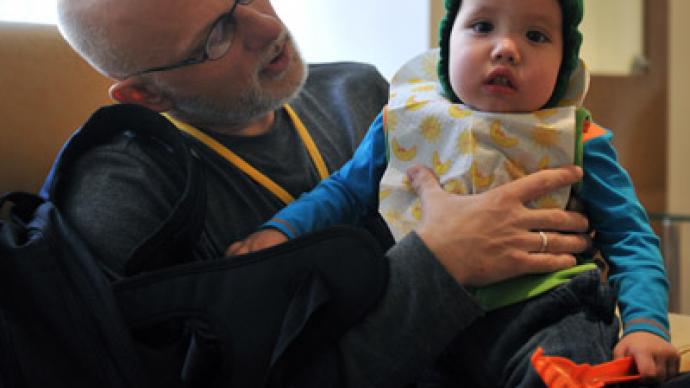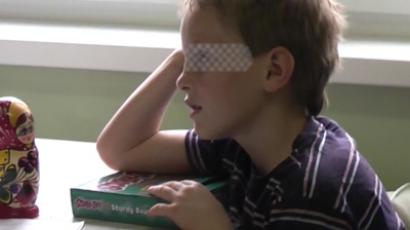Adequate or faulty? Russian lawmakers vote for US adoption ban amid criticism

A fierce debate is raging in Russia as the country’s Lower House of Parliament readies a ban on US citizens adopting Russian children.
Russian lawmakers have approved the so-called ‘Dima Yakovlev’ bill in a second reading – despite the controversy surrounding the bill, only 17 MPs out of 417 voted against it, with 399 in favor. To become law, it must be approved in a third reading, passed by the Upper House and then signed by the president.The bill was initiated by the ruling United Russia party. While it attempts to address some problems with adoption protocol, it is also said to be a response to the Magnitsky Act which was recently signed into law by President Obama. The act, named after lawyer Sergey Magnitsky, who died in pre-trial detention in Moscow, bans certain Russian officials who were allegedly involved in the death from visiting the US and freezes their American-held assets.If the Yakolev bill is signed into law, it will effectively prohibit any adoption of Russian orphans by US couples and stop the work of any organisations that act as intermediaries in the adoption process. Additional amendments suggest that a similar ban should be imposed on any other foreign country which supports the Magnitsky Act.
‘Don’t drag kids into politics’
The prospect of an adoption ban has sparked a wave of outrage in Russia, with many public figures voicing strong opposition to the bill after the Russian Duma approved amendments in the first reading on Monday evening.Prominent Russian journalists, artists, human rights activists have called on government officials to drop the ban.“We hope we are united in understanding that children should never be dragged into politics under any circumstances,” states one of the petitions initiated by Russian adoptive parents, which has already collected thousands of signatures online.Those in the opposition to Dima Yakovlev bill have been quick to accuse Russian MPs of holding kids hostage to a political stand-off with the United States. They insist the main victims of such a response to the Magnitsky Act will be Russian orphans, who will be deprived of an additional chance of finding new adoptive parents.“We know that over 120,000 children are in Russian orphanages, most of whom will never get qualified medical treatment, parental love and tenderness. We know that Russian citizens rarely adopt seriously ill children, because it’s very hard to pay for needed rehabilitation,” warns the adoptive parents group in its petition.
Faulty ‘tit for tat’ logic?
The proposed legislation has sparked heated discussion between some of Russia’s most senior politicians with some standing against the adoption ban.Education Minister Livanov and Foreign Minister Lavrov are speaking out saying that the logic behind the ban is faulty and wrong.Lavrov argues that those responsible for neglecting Russian adoptees are the ones who should be held responsible for the abuse, including US judges who fail to give out proper sentences.The Education Minister believes this ‘tit for tat’ response is wrong “because children may suffer if no adoptive parents are found for them in Russia.”Also, Minister for Open Government Affairs Abyzov agrees that the introduction of the ban "will be a big mistake" pointing out that "it will be the children, especially those with limited mobility, who suffer”.
Russia should ‘stop exporting its children’
Supporters of the bill say it is necessary in order to protect Russian children from potential abuse at the hands of their American adoptive parents.Russian Children’s Rights ombudsman Pavel Astakhov supports a ban on all adoptions from abroad, not just the US. In his view, the government should promote adoption inside Russia instead of “exporting children to other countries”. The Federal program “Russia without orphans” is designed for that purpose, to assist prospective parents find suitable children to give a home to.According to Astakhov’s data, only 5 per cent of kids adopted by foreigners were disabled. During one year, Americans fostered 44 disabled kids, while 188 children with special needs found new families in Russia.
- 19 registered deaths of Russian kids adopted by Americans; 1,500 deaths of children adopted by Russians since 1996- More than 82,000 orphans registered in Russia as of December 2011 - Over 14,000 Russian kids adopted last year; about 11,000 of them by Russians and 3,400 by foreign families (over 31%) - Nearly 1000 Russian children were adopted by Americans, including 89 disabled children
Astakhov pointed to an instance where US authorities denied diplomatic access to Maksim Babayev, a six-year-old Russian boy who suffered psychological and physical abuse at the hands of his adoptive parents in the US.Criticisms have been leveled against the US judicial system for its insufficient response to cases of abuse of Russian children by their adoptive American parents.Deputy Duma Speaker Sergey Neverov added that if the ban must remain in force if it is approved, as long as US courts continue to pass ‘biased’ rulings.Speaking on the abuses, President Putin heavily criticized US authorities for their handling of cases where Russian orphans died in American foster families."We are indignant not so much at these tragedies – even though it’s the worst thing that can happen – as at the reaction of the [US] government, a punitive reaction. That’s what is bad,” President Putin said.One of the authors of Dima Yalovlev bill is Ekaterina Lakhova from State Duma’s committee for social and religious organizations. She believes the legislation is needed because protocols with the US make it hard for the Russian authorities to ensure Russian kids are well treated by their new families:“The US legislation [on adoption] varies from state to state, and it often happens that the child adopted by one family is transferred to another foster family. This has happened many times,” she says.A total of 19 Russian children have died while in the care of their adoptive parents in the US since the mid 1990s, claims Pavel Astakhov who thinks the ban should have been imposed back in 2010.
Dima dies of ‘plain negligence’
Russian born Dima Yakovlev was adopted by Carol and Miles Harrison in 2008. Three months later the 21-month-old toddler died from heatstroke after his new father forgot to drop him at daycare before carrying on to work. Instead, Harrison left the baby strapped in a car seat in front of his office under the scorching sun with the temperature inside reaching 170 degrees Fahrenheit. The body was discovered by Harrison’s colleague nine hours later.After facing involuntary manslaughter charges with a possible 10 year prison term, Miles Harrison was acquitted of any wrongdoings by the court. The judge ruled that despite being “plainly negligent,” Mr. Harrison had not shown “callous disregard for human life,” which is the legal standard for involuntary manslaughter in the US.
Un-wanted Artyom sent back to Russia
In April 2010, seven-year-old Artyom Savelyev arrived in Russia by himself after being sent home by his adoptive mother like a parcel. The boy had a note with him that read, “I no longer want to parent this child,” signed by his foster mother. Torry Hansen, who claimed she was overwhelmed by the boy's psychological problems, accused the orphanage employees of covering up his “mental stability and other issues.” Russian doctors who examined the boy after the incident however detected no abnormalities in Artyom’s behaviour.Criminal charges were never filed against the woman, but the adoption agency involved in the case sued the woman for $150,000 in child support. Despite the fact this headline-making case sparked a diplomatic row between Moscow and Washington with several Russian families expressing an intention to adopt the boy, Artyom is still living in a foster home near Moscow.
Nothing can replace family
Although there have been a number of cases of mistreatment, the vast majority of Russian children adopted by American parents live happy lives. Russian families tend to adopt babies and kids under school age – older children have fewer chances to find a new home. One American family, who spoke with RT, told the story of their adopted daughter, who was taken from her biological mother by social workers due to neglect and abuse. The girl lived in an orphanage before being adopted by her new family at the age of nine, except for a brief period when she was taken in by a family that later rejected her.The girl had some problems adjusting to an American family, and displayed “symptoms of a traumatized child who wanted to be the only child, and get rid of others,” her new mother said, adding that the girl was at first cruel to her three-year-old sister and four-year-old brother. The parents did their best to comfort her, but it took seven years for her to finally reveal the abuses she suffered while living in the Russian orphanage.“It took a long time for her to adjust to the family, and only recently we learned a lot of things about our daughter,” the woman said. “Only two years ago she told me how much she was abused physically and sexually by other children in that family orphanage, and also by the orphanage’s mother.”The girl was suffering from “attachment issues, possible attachment disorder, trauma in early years of development, neglect during early stage brain development and anxiety.”Her parents enrolled her in several activities to help her adjust to her new life. “She does cross-country running, plays basketball, soccer, baseball, knows how to play saxophone, piano, and guitar,” the mother said, adding that she is continuing to work on her “mother issues” and teach her “coping skills for anxiety.”“Kids who are adopted in their teens struggle to do their best even with all the help they get, just because their problems are too severe, the neglect in their early years affects them for life,” she said.
It remains to be seen if President Putin will sign the bill into law in the coming days. If he does, the new legislation could be put into effect as early as January 2013.













